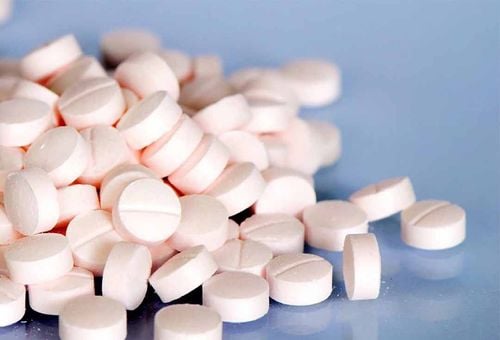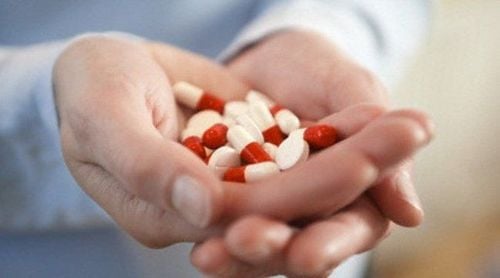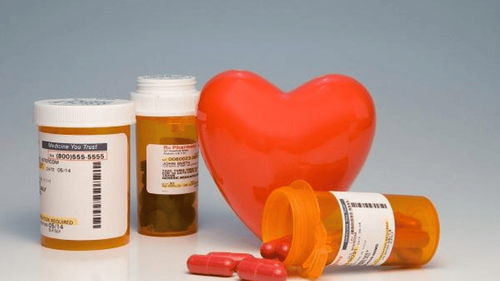This is an automatically translated article.
The article was professionally consulted by Specialist II, Senior Doctor Doan Du Dat - General Internal Medicine - Department of Medical Examination and Internal Medicine - Vinmec Ha Long International Hospital.High cholesterol is dangerous because it increases the risk of many serious diseases. Accumulation of cholesterol in the blood can combine with other substances and develop into plaque. Plaque then begins to grow in blood vessels, and restricts normal blood flow to organs. That lays the groundwork for chronic and potentially life-threatening conditions. Here are 5 diseases related to high cholesterol that you should know.
1. Related to heart failure
Cholesterol is a type of fat that exists in the blood as high-density lipoprotein (HDL) and low-density lipoprotein (LDL). HDL is known to be a beneficial type of cholesterol because it has the ability to carry cholesterol back to the liver for elimination. LDL, on the other hand, has the ability to transport cholesterol to other parts of the body. LDL is considered a type of bad cholesterol. Too much LDL in the blood can cause adhesions to the artery walls and block the arteries. Causes ischemic heart disease leading to heart failureNarrowed or blocked arteries reduce blood flow to the heart, brain or other organs leading to stroke, heart attack or even heart failure. Overall, high levels of HDL and low LDL cholesterol help reduce the risk of heart-related diseases.
The liver is the organ that produces all the cholesterol needed by the body. However, the foods in the daily diet can also be a rich source of cholesterol. Too much cholesterol in the blood can cause a number of dangerous diseases. Here are 5 diseases associated with high cholesterol:
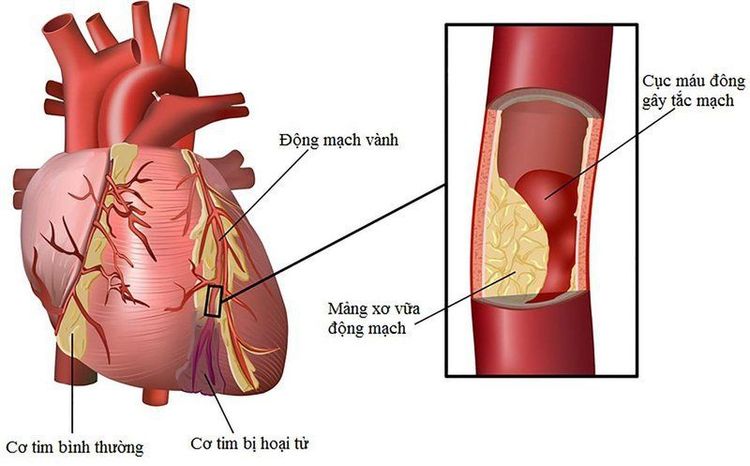
Tăng cholesterol có thể gây đột quỵ
2. Involvement in cerebrovascular accident: Cerebral infarction, transient ischemic attack or cerebral hemorrhage)
Why can high cholesterol increase the risk of stroke? The above question has been studied and answered by scientists through the mechanism: Too much cholesterol in the blood can cause fatty substances to accumulate in the arteries, which causes the arteries to narrow and harden, causing the blood to thicken. more difficult to circulate as well as increase the risk of blood clots . Of course, the blood flow to the organs is therefore not guaranteed, including the brain, leading to an increased risk of stroke.High cholesterol usually does not bring noticeable symptoms, so to ensure cholesterol levels are at a safe level, it is necessary to have blood cholesterol checked regularly, especially for people over 40 years old and have other factors. Risk factors below:
History of cardiovascular disease Family history of high cholesterol Being overweight, obese Having high blood pressure or diabetes Cholesterol levels can be checked through blood tests relatively simple.
If you have high blood cholesterol and fear it increases your risk of heart disease or stroke, go to medical facilities for a checkup. Doctors can prescribe some medications to help lower cholesterol levels in the blood. Drugs known collectively as statins have the ability to prevent the formation of plaque in the blood vessels, thereby reducing the risk of stroke.

Béo phì làm tăng nguy cơ mắc cholesterol cao
3. Related to coronary heart disease
The main risk from high cholesterol is coronary heart disease. If blood cholesterol levels are too high, they can build up in artery walls and are called plaques. Over time, the accumulation of these plaques causes atherosclerosis. This causes the arteries to narrow, slowing blood flow to parts of the body including the heart. Reduced blood flow can lead to angina, heart attack, or even heart failure if the blood vessel is completely blocked.Some studies have concluded that daily cholesterol consumption should not exceed the 300-milligram threshold. However, recently, American scientists have made recommendations to limit cholesterol consumption as much as possible. Studies and trials have proven that a healthy diet with low cholesterol can reduce the risk of cardiovascular disease in adults.
An eight-week study published in 2016 has shown that elevated LDL cholesterol is a risk factor for cardiovascular diseases. In addition, fatty acids in the diet also play an important role in the development of heart disease. The researchers found that making some small changes to your daily diet to lower your cholesterol could potentially reduce your risk of future heart disease.
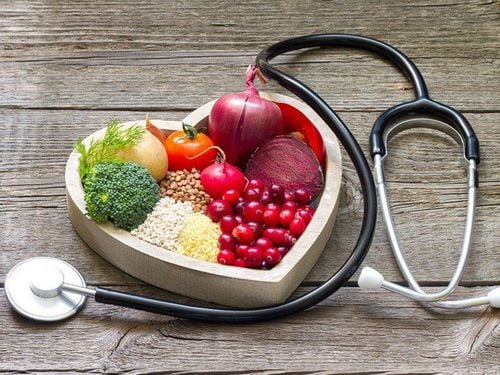
Chế độ ăn uống lành mạnh giúp phòng chống bệnh về tim mạch
4. Peripheral vascular disease
Peripheral vascular disease is a blood circulation disorder that is directly caused by atherosclerosis due to too high levels of cholesterol in the blood. In peripheral vascular disease, the blood vessels outside the heart and brain become narrow, blocked, or constricted. This phenomenon can occur in both arteries and veins. Peripheral vascular disease causes frequent fatigue and pain, usually in the lower extremities, and the pain improves with rest. In peripheral vascular disease, the blood vessels become narrow resulting in decreased blood flow. This happens because of hardening of the arteries or constriction of blood vessels.Peripheral artery disease (PAD) is the most common form of diseases involving peripheral blood vessels. PAD occurs only in the arteries, which carry oxygen-rich blood from the heart to other organs. According to the Centers for Disease Control, between 12% and 20% of people over 60 have peripheral artery disease.
5. High cholesterol often accompanies diabetes
Nowadays, it is not uncommon in the world to have both diabetes and high cholesterol in the blood. The American Heart Association has issued a statement that diabetes lowers good cholesterol (HDL cholesterol) and increases bad cholesterol (LDL cholesterol). Both of the above factors increase the risk of cardiovascular diseases as well as strokeAs recommended by scientists: An LDL cholesterol level below 100 mg/dL of blood is considered ideal while between 100 - 129 mg/dL of blood is close to ideal and 130-159 mg/dL of blood is the maximum level of LDL cholesterol for each person.
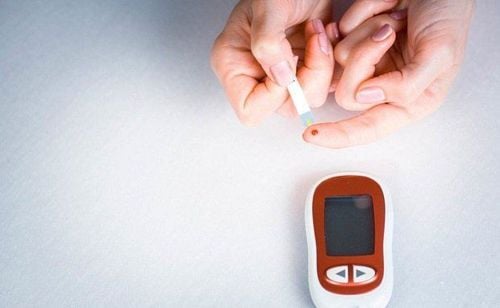
Người bệnh có thể mắc đồng thời cholesterol cao và bệnh đái tháo đường
6. Relating to high blood pressure
Reality has shown that all people who have high cholesterol and have had to use drugs as well as change some daily habits for treatment should always closely monitor their blood pressure. People with high cholesterol also regularly deal with high blood pressure.According to the World Health Organization (WHO), high blood pressure is a condition in which the blood pressure on the walls of blood vessels is always high. One of the reasons why the heart has to work harder to pump blood to other organs is because the walls of the arteries are hardened, causing blood flow to decrease. The main cause of atherosclerosis is high cholesterol, especially LDL cholesterol.
Over time, too much blood pressure on the vessel walls can damage the arteries as well as other blood vessels. These injuries can lead to more plaque buildup as well as narrower arteries due to high cholesterol levels in the blood. In addition, the heart also has to work harder to pump blood to other organs, causing damage to the heart muscle. Both high cholesterol and high blood pressure occur at the same time, and the impact on a person's heart health declines. Over time, high blood pressure and cholesterol levels can cause damage to several target organs such as eyes, kidneys, brain,...
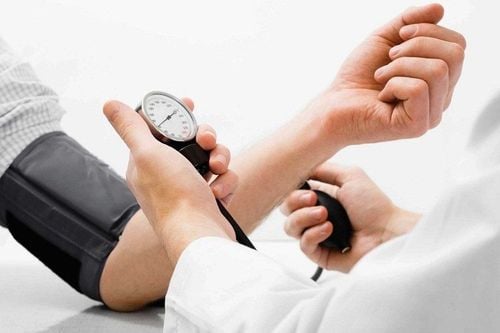
Tăng huyết áp có thể xảy ra đối với người cholestol cao
High cholesterol can lead to many dangerous diseases. Therefore, right now, you need to create a healthy lifestyle and eating habits to prevent and treat diseases. For the best health protection, you should have regular general health checks so that you can monitor your blood cholesterol levels, take action when necessary, and detect other health problems early.
In addition to high total cholesterol, it is necessary to pay attention to the increase of Triglycerides. is a form of fat that our bodies still consume every day. Triglycerides are also one of the main components of animal and vegetable fats. After the body digests Triglycerides will be consumed as cellular energy as it moves through the blood vessels. If the body accumulates too much Triglyceride, it will make the blood fat level of Triglyceride high and harmful to the body. Triglycerides stick to the walls of blood vessels, causing fatty plaques on the arteries, hindering blood circulation. High blood lipid index Triglyceride warns the risk of atherosclerosis, myocardial infarction, blood fat, fatty liver, stroke, especially causing acute pancreatitis ...
When testing to assess the status of blood lipids Normally, 4 components need to be tested:
Total cholesterol HDL - LDL cholesterol - Cholesterol Triglyceride Currently, Vinmec International General Hospital has general health checkup packages suitable for each age, gender and needs Customer's individual requirements with reasonable price policy, including:
Diamond general health checkup package Vip general health checkup package Special general health checkup package Comprehensive general health checkup package standard general health The patient's examination results will be returned to the home. After receiving the results of the general health examination, if you detect diseases that require intensive examination and treatment, you can use services from other specialties right at the Hospital with quality treatment and services. outstanding customer service.
Please dial HOTLINE for more information or register for an appointment HERE. Download MyVinmec app to make appointments faster and to manage your bookings easily.
References: webmd.com, stroke.org.uk, healthline.com, diabetes.org.uk, cdc.gov






